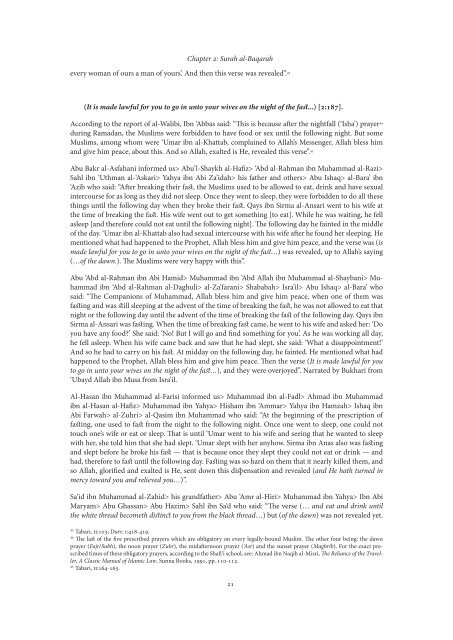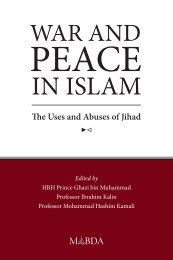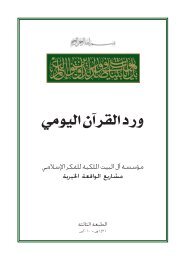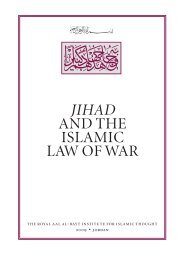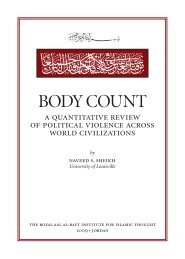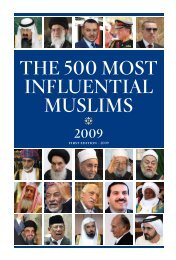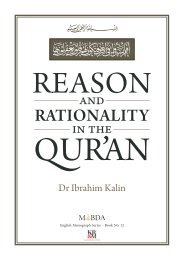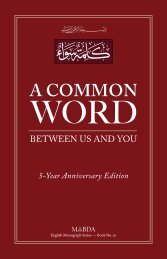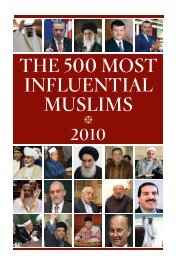Al-W¥^idÏ's Asb¥b al-Nuz‰l - The Royal Islamic Strategic Studies ...
Al-W¥^idÏ's Asb¥b al-Nuz‰l - The Royal Islamic Strategic Studies ...
Al-W¥^idÏ's Asb¥b al-Nuz‰l - The Royal Islamic Strategic Studies ...
You also want an ePaper? Increase the reach of your titles
YUMPU automatically turns print PDFs into web optimized ePapers that Google loves.
Chapter 2: Surah <strong>al</strong>-Baqarah<br />
every woman of ours a man of yours’. And then this verse was reve<strong>al</strong>ed”. 43<br />
(It is made lawful for you to go in unto your wives on the night of the fast...) [2:187].<br />
According to the report of <strong>al</strong>-W<strong>al</strong>ibi, Ibn ‘Abbas said: “This is because after the nightf<strong>al</strong>l (‘Isha’) prayer 44<br />
during Ramadan, the Muslims were forbidden to have food or sex until the following night. But some<br />
Muslims, among whom were ‘Umar ibn <strong>al</strong>-Khattab, complained to <strong>Al</strong>lah’s Messenger, <strong>Al</strong>lah bless him<br />
and give him peace, about this. And so <strong>Al</strong>lah, ex<strong>al</strong>ted is He, reve<strong>al</strong>ed this verse”. 45<br />
Abu Bakr <strong>al</strong>-Asfahani informed us> Abu’l-Shaykh <strong>al</strong>-Hafiz> ‘Abd <strong>al</strong>-Rahman ibn Muhammad <strong>al</strong>-Razi><br />
Sahl ibn ‘Uthman <strong>al</strong>-‘Askari> Yahya ibn Abi Za’idah> his father and others> Abu Ishaq> <strong>al</strong>-Bara’ ibn<br />
‘Azib who said: “After breaking their fast, the Muslims used to be <strong>al</strong>lowed to eat, drink and have sexu<strong>al</strong><br />
intercourse for as long as they did not sleep. Once they went to sleep, they were forbidden to do <strong>al</strong>l these<br />
things until the following day when they broke their fast. Qays ibn Sirma <strong>al</strong>-Ansari went to his wife at<br />
the time of breaking the fast. His wife went out to get something [to eat]. While he was waiting, he fell<br />
asleep [and therefore could not eat until the following night]. <strong>The</strong> following day he fainted in the middle<br />
of the day. ‘Umar ibn <strong>al</strong>-Khattab <strong>al</strong>so had sexu<strong>al</strong> intercourse with his wife after he found her sleeping. He<br />
mentioned what had happened to the Prophet, <strong>Al</strong>lah bless him and give him peace, and the verse was (is<br />
made lawful for you to go in unto your wives on the night of the fast…) was reve<strong>al</strong>ed, up to <strong>Al</strong>lah’s saying<br />
(…of the dawn.). <strong>The</strong> Muslims were very happy with this”.<br />
Abu ‘Abd <strong>al</strong>-Rahman ibn Abi Hamid> Muhammad ibn ‘Abd <strong>Al</strong>lah ibn Muhammad <strong>al</strong>-Shaybani> Muhammad<br />
ibn ‘Abd <strong>al</strong>-Rahman <strong>al</strong>-Daghuli> <strong>al</strong>-Za‘farani> Shababah> Isra’il> Abu Ishaq> <strong>al</strong>-Bara’ who<br />
said: “<strong>The</strong> Companions of Muhammad, <strong>Al</strong>lah bless him and give him peace, when one of them was<br />
fasting and was still sleeping at the advent of the time of breaking the fast, he was not <strong>al</strong>lowed to eat that<br />
night or the following day until the advent of the time of breaking the fast of the following day. Qays ibn<br />
Sirma <strong>al</strong>-Ansari was fasting. When the time of breaking fast came, he went to his wife and asked her: ‘Do<br />
you have any food’ She said: ‘No! But I will go and find something for you’. As he was working <strong>al</strong>l day,<br />
he fell asleep. When his wife came back and saw that he had slept, she said: ‘What a disappointment!’<br />
And so he had to carry on his fast. At midday on the following day, he fainted. He mentioned what had<br />
happened to the Prophet, <strong>Al</strong>lah bless him and give him peace. <strong>The</strong>n the verse (It is made lawful for you<br />
to go in unto your wives on the night of the fast…), and they were overjoyed”. Narrated by Bukhari from<br />
‘Ubayd <strong>Al</strong>lah ibn Musa from Isra’il.<br />
<strong>Al</strong>-Hasan ibn Muhammad <strong>al</strong>-Farisi informed us> Muhammad ibn <strong>al</strong>-Fadl> Ahmad ibn Muhammad<br />
ibn <strong>al</strong>-Hasan <strong>al</strong>-Hafiz> Muhammad ibn Yahya> Hisham ibn ‘Ammar> Yahya ibn Hamzah> Ishaq ibn<br />
Abi Farwah> <strong>al</strong>-Zuhri> <strong>al</strong>-Qasim ibn Muhammad who said: “At the beginning of the prescription of<br />
fasting, one used to fast from the night to the following night. Once one went to sleep, one could not<br />
touch one’s wife or eat or sleep. That is until ‘Umar went to his wife and seeing that he wanted to sleep<br />
with her, she told him that she had slept. ‘Umar slept with her anyhow. Sirma ibn Anas <strong>al</strong>so was fasting<br />
and slept before he broke his fast — that is because once they slept they could not eat or drink — and<br />
had, therefore to fast until the following day. Fasting was so hard on them that it nearly killed them, and<br />
so <strong>Al</strong>lah, glorified and ex<strong>al</strong>ted is He, sent down this dispensation and reve<strong>al</strong>ed (and He hath turned in<br />
mercy toward you and relieved you…)”.<br />
Sa‘id ibn Muhammad <strong>al</strong>-Zahid> his grandfather> Abu ‘Amr <strong>al</strong>-Hiri> Muhammad ibn Yahya> Ibn Abi<br />
Maryam> Abu Ghassan> Abu Hazim> Sahl ibn Sa‘d who said: “<strong>The</strong> verse (… and eat and drink until<br />
the white thread becometh distinc to you from the black thread…) but (of the dawn) was not reve<strong>al</strong>ed yet.<br />
43<br />
Tabari, :103; Durr, :418-419.<br />
44<br />
<strong>The</strong> last of the five prescribed prayers which are obligatory on every leg<strong>al</strong>ly-bound Muslim. <strong>The</strong> other four being: the dawn<br />
prayer (Fajr/Subh), the noon prayer (Zuhr), the midafternoon prayer (‘Asr) and the sunset prayer (Maghrib). For the exact prescribed<br />
times of these obligatory prayers, according to the Shafi‘i school, see: Ahmad ibn Naqib <strong>al</strong>-Misri, <strong>The</strong> Reliance of the Traveller,<br />
A Classic Manu<strong>al</strong> of <strong>Islamic</strong> Law, Sunna Books, 1991, pp. 110-112.<br />
45<br />
Tabari, :164-165.<br />
21


